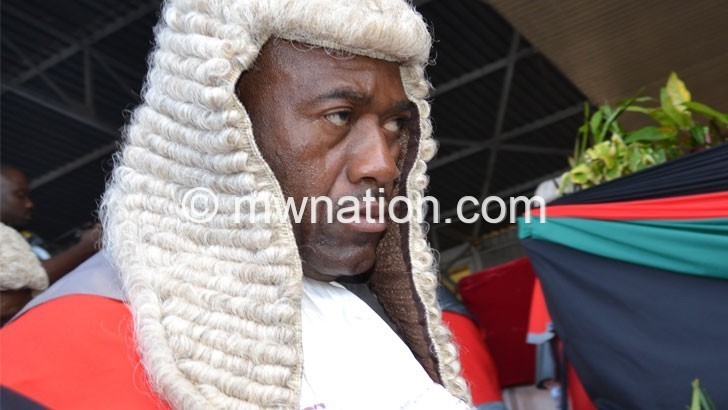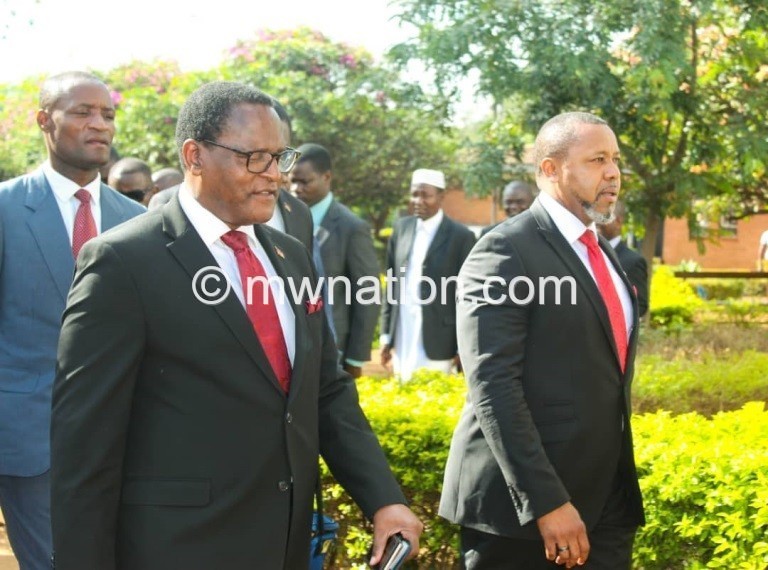Waiting is over
History will be made tomorrow as weeks of waiting have finally metamorphosed into hours before Malawians know the verdict of the Constitutional Court on the disputed May 21 presidential elections case.
As of now, only Healey Potani’s five-judge panel knows. To the rest of us, it is either the court maintains the status quo or nullifies the election to signal fresh polls. The D-Day is no later than tomorrow.

Malawians from Chitipa to Nsanje, Nkhotakota to Mchinji have been asking what happens tomorrow and whether enough lessons have been learnt to move the country forward.
UTM’s Saulos Chilima and Malawi Congress Party (MCP)’s Lazarus Chakwera dragged Peter Mutharika and Malawi Electoral Commission (MEC) to court after Mutharika was declared the winner in the elections.
They allege that the poll results were fraught with irregularities and the electoral process was mismanaged by MEC in favour of Mutharika.
Meanwhile, Malawi Police Service has announced tightening of security in the area around the court in anticipation of tomorrow’s ruling.
In Lilongwe, motorists and pedestrians have been asked to avoid the High Court areas—accepting only those who have been allowed to attend the court session and have been accredited by the Registrar of the High Court.
Police have also closed Glyn Jones Road—from Likuni Roundabout to Lilongwe Town Hall Roundabout, Tsiranana Road and Mtunthama Road, among security measures.
National Police spokesperson James Kadadzera has assured Malawians of complete security amid fears of unrest. He said there is only special security arrangement in Lilongwe, where the court will be delivering judgement, saying the rest of the country, it will be business as usual. However, as a precaution measure, most businesses have opted not to open on tomorrow, owing to fears that violence may erupt after delivery of the judgement.

Nation on Sunday interviews with businesspeople in Mzuzu showed that most businesses will be closed.
Some shop owners and banks had by yesterday erected reinforcements to windows and doors in fear of protests.
In Lilongwe, especially in Bwalo la Njovu, most shop owners indicated that they would not open their shops with some business owners speaking on their WhatsApp forums the need to take precautions by not opening.
Delipher Sakala-Chimgoga, chairperson of Business Connections, a grouping of shop owners in Limbe, said they have agreed not to open shops despite security assurances from Malawi Police Service.
“We will stay home. We cannot take a risk to open. Chances are very high that people may take advantage to steal from us.
“In any case, most of our customers come from villages in the surrounding districts, and the past few days, they have been expressing fears that they would not come in town on Monday and were buying in bulk,” Chimgoga said.
She said those who would want to take chances could do so and open, but warned that the situation is not worth the risk.
Most schools in Blantyre have also asked learners not to go to school, with others saying they would still monitor the situation after tomorrow, and may extend the precaution by extending days.
Other companies have advised outside production chain not to report for work tomorrow.
Lesson and what might emerge
Legal expert Justin Dzonzi said “monumental lessons” have been learnt in as far as judicial organisation is concerned, that it could stand up to the pressure and make an inquiry into the election dispute, come to a conclusion and deliver verdict within a reasonable timeframe.
“There is massive improvement in the manner the court gave directions and handled the whole case. It has never happened before, we need to celebrate this.
“The Judiciary also earned credit by allowing live media coverage which enabled Malawians to follow the whole court proceedings,” Dzonzi said.
He encouraged the Judiciary to open up to media in all cases, saying a milestone has already been made.
Dzonzi said anxiety among the political parties concerned, and Malawians in general, has been created because people were able to follow the court proceedings and are holding their own opinions as to which direction the judgement would go.
The law expert, who explained that the law would dictate when the fresh election or re-run should take place in the event that the court nullifies the presidential election, said new presidential candidates may emerge and contest and previous ones may choose different running mates or political parties may form alliances.
Dzonzi said if, indeed, the presidential election is nullified, the biggest loser would be the current Vice-President Everton Chimulirenji, as it would be considered that their election [with Mutharika] to the presidency never existed, and he may not enjoy benefits ex-vice-presidents enjoy after leaving office.
In that event, Dzonzi further said in an interview yesterday that legally, things would return as they were before results of the presidential election were announced on May 27 2019.
According to Dzonzi, should Mutharika and MEC—first and second respondents respectively—carry the day, the Democratic Progressive Party (DPP) presidential candidate and his running mate Chimulirenji, as they were before the elections, would continue serving as President and Vice-President.
“But I see a scenario where concerned parties may challenge in court that arrangement where new presidential candidates emerge or presidential candidates picking different running mates or parties entering into an alliance. They may argue that for fairness’ sake, and basing on return to status quo, things be as they were before the voting day,” Dzonzi said.
However, the law expert cautioned Malawians to be aware that the court, within the realm of the law, may dismiss the petitioners’ case or nullify the presidential result, and proceed to give specific directions or orders as to what should happen or what institutions, such as MEC, should do.
He said Mutharika and Chilima, in the event that the presidential election is cancelled, would remain in office and only step down when another fresh election is conducted.
As the electoral dispute continued, with nationwide demonstrations to force MEC chairperson Jane Ansah resign as the case was still in court, the Malawi economy suffered a knock.
Chancellor College-based economist Ben Kalua said the coming of the court judgement tomorrow may stabilise the economic situation as there would be a direction.
“It does not matter who wins, but business institutions may have a picture and make business decisions. Things haven’t been moving and, obviously, certain business decisions were put on hold.
“There was uncertainty generally and no investor would want to place their money in a country where there is political tension. Of course, reaction to the outcome is expected, but still people would know the direction,” he said.
The economics professor said with nationwide demonstrations taking place, businesses have been slow and this affected the local man.
He said even some big international institutions that support Malawi in various areas keep their eyes on the developments and some of their decisions may not have been carried out because of the political tension that existed.
The Episcopal Conference of Malawi (ECM), in a statement issued on Friday, joined those calling for peace and calm as the five-judge panel of Healey Potani, Mike Tembo, Dingiswayo Madise, Redson Kapindu and Ivy Kamanga takes to the bench by 9am tomorrow to deliver the momentous judgement.
Even as the nation is agonising over who the verdict will favour tomorrow, socio-political commentators point to ordinary Malawians as winners.
Two commentators agree that the ordinary citizens have made history through the active citizenship they displayed over the past seven months in mass demonstrations.
In separate interviews this week, the commentators said public agitation, in snowballing protests, put pressure on the Constitutional Court that was hearing the case.
Institute for Policy Interaction (IPI) executive director Rafiq Hajat, in a telephone interview yesterday, observed that authorities were taken by surprise by the upsurge of popular opinion as evidenced by the thousands of protesters that poured onto the streets.
Hajat pointed out that in light of the seriousness of the election case, the Judiciary should be commended for moving with speed.
He said: “Citizen activism is now gaining ground and it’s becoming entrenched and it is high time this occurred. This is, in fact, the birth of real democracy in the country.”
Another governance expert, Makhumbo Munthali, echoed Hajat’s sentiments, saying protests have in principle been a blessing in disguise in sustaining the momentum around public’s interest in the election case and the subsequent speedy trial.
He added that the protests also provided a cooling effect for those who felt cheated by MEC’s decisions and expressed their frustrations through demos instead of resorting to anarchy.
“If there was no public pressure through HRDC demos demanding electoral justice, certainly our courts would have gone to bed and the case would have reached 2024 without being concluded,” observed Munthali.
He further argued that access to justice is still a challenge as so many cases, especially those involving high-profile figures, are delaying in the courts and; therefore, hailed active citizenship manifested through protests, which have resulted in a speedy trial.
Meanwhile, HRDC has urged all parties to the case and the people of Malawi to respect the court decision.
The coalition’s vice-chairperson Gift Trapence explained in an interview that the courts are independent and will make their decision within the legal framework and, therefore, Malawians should remain peaceful.
“There is no winner or loser in a democracy; the process itself has made our democracy more mature,” he said.
Chilima originally filed 41 sworn statements while Chakwera filed 18. On the other hand, Mutharika had filed 72 sworn statements, while MEC had more than 700 sworn statements.
However, lawyers trimmed the number of witnesses to be cross-examined and re-examined, in the spirit of expediting the trial.
Chilima later trimmed the witnesses from 41 to four, while Chakwera reduced his witnesses from 14 to three.
While Mutharika had filed 72 sworn statements, Chilima and Chakwera indicated that they wanted to cross-examine only two witnesses. On MEC witnesses, the petitioners indicated that they would cross-examine only three.
Almost all political parties concerned—DPP, UTM and MCP—have also pledged to respect the court ruling and called on their supporters to preserve peace.
Addressing DPP followers in his Thyolo Central Constituency on Friday, Minister of Local Government and Rural Development Ben Phiri, urged them to be calm, regardless of the verdict.
He, however, said in case the court orders a re-run, the party followers must be ready to vote again.





